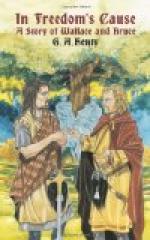Ronald had kept near Archie in the fight, and when all was lost ran along by the side of his horse, holding fast to the stirrup leather. The horsemen still pressed along between the river and the morass, and Archie, following the example of several of the chiefs, alighted from his saddle, and with his companion entered the swamp. It was with the greatest difficulty that he made his way across it, and his lightly armed companion did him good service in assisting several times to drag him from the treacherous mire when he began to sink in it. At last they reached firmer ground in the heart of the swamp, and here some 5000 or 6000 fugitives were gathered. At least 4000 had fallen on the field. Many had escaped across the river, although numbers had lost their lives in the attempt. Others scattered and fled in various directions. A few of the chiefs were gathered in council when Archie arrived. They agreed that all was lost and there was nothing to do but scatter to their homes. Archie took no part in the discussion. That day’s experience had convinced him that nothing like a permanent and determined insurrection was possible, and only by such a movement could the Scottish cause be aided, by forcing the English to send reinforcements across St. George’s Channel. After seeing the slaughter which had taken place, he was rejoiced at heart that the rising had commenced before he joined it, and was in no way the result of his mission, but was one of the sporadic insurrections which frequently broke out in Ireland, only to be instantly and sternly repressed.
“We have failed, Sir Knight,” one of the chiefs said to him, “but it was not for want of courage on the part of our men.”
“No, indeed,” Archie replied through his interpreter; “never did I see men fight more fiercely, but without discipline and organization victory is well nigh impossible for lightly armed footmen against heavy mailclad cavalry.”
“The tactics you advised were doubtless good,” the chief said; “I see their wisdom, but they are well nigh impossible to carry out with such following as ours. They are ever impatient for the fray, but quickly wearied by effort; ready to die, but not to wait; to them prudence means cowardice, and their only idea of fighting is to rush full at a foe. See how they broke the English spearmen!”
“It was right well done,” Archie replied, “and some day, when well trained and disciplined, Irish soldiers will be second to none in the world; but unless they will submit to training and discipline they can never hope to conquer the English.”
“And now, Sir Knight, what do you propose doing?” the chief said.
“I shall make my way north,” Archie replied, “and shall rejoin my king at Rathlin.”
“I will send two of my men with you. They know every foot of the morasses of this neighbourhood, and when they get beyond the point familiar to them will procure you two others to take their places. It will need all your prudence and courage to get through, for the English men-at-arms will be scouring the country in groups of four, hunting all those they come across like wolves. See, already!” and he pointed to the horizon; “they are scattering round the edge of the morass to inclose us here; but it is many miles round, and before tomorrow is gone not a man will be left here.”




